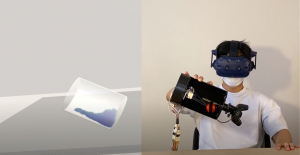
UW ECE alumnus Frank Liu (pictured above and below) is co-leading an interdisciplinary team at Arizona State University that has demonstrated the experience of fluid dynamics within a variety of vessel shapes in a virtual reality (VR) setting. Liu’s device, Geppetteau, uses a string-driven mechanism and weight to replicate the sensation of liquids. Photo courtesy of Meteor Studio
Adapted from an article by Shane Davis and Sarah McCarty | ASU News
As the possibilities of virtual reality (VR) sensory experiences continue to expand, one area that could use some attention is fluid dynamics.
Now, UW ECE alumnus Frank Liu (BSEE ’18), who is currently a doctoral student at Arizona State University, has figured out a way to allow someone to feel virtual liquids. Liu’s device, named Geppetteau, uses a string-driven mechanism to actuate a weight, which moves according to the center of mass of a virtual fluid.
He said the potential use of the device is limitless, from education and workforce training to virtual reality games.
“The plan is to eventually have a full assortment of vessels so the user can experience various scenarios where liquid is used,” Liu said, “like in chemistry lab courses, for example.”
Liu, who presented his work at the Tangible Embedded and Embodied Interaction conference in Warsaw, Poland, from Feb. 26 to March 1, credits the collaboration with his research team at ASU’s Meteor Studio for moving his work forward.

Liu received his bachelor’s degree from UW ECE in 2018 with departmental honors. During his time at UW ECE, he conducted research in the Ubicomp Lab under supervision by Washington Research Foundation Endowed Professor Shwetak Patel, who holds a joint appointment between UW ECE and the Allen School. Liu also was heavily involved in Advanced Robotics at the University of Washington (ARUW) as an undergraduate student. Photo courtesy of ASU News
“It’s just been such a wonderful experience being part of Meteor Studio,” he said. “Our team is spread out across different schools — some are in computer science, some are in design, some are also in digital culture — and so this is really a testament to ASU and the interdisciplinary nature of work at Arizona State University and how it really encourages and fosters that collaborative environment.”
In addition to Liu, who is a fifth-year doctoral student studying computer engineering in the Ira A. Fulton Schools of Engineering, the Geppetteau team includes Robert LiKamWa, Liu’s advisor and associate professor in the School of Arts, Media and Engineering and the School of Electrical, Computer and Energy Engineering, and co-lead Shahabedin Sagheb, collegiate assistant professor at Virginia Tech. The team also includes ASU students Alex Vuong (digital culture, School of Arts, Media and Engineering), Shawn Dai (computer science, Fulton Engineering) and Ryan Wirjadi (computer science, Fulton Engineering), and ASU alum Alice Bao.
Geppetteau works with VR technology to allow users to experience fluid dynamics in a comfortable virtual setting. They can both see the liquid moving around in a vessel and simultaneously experience the feeling of the fluid in the tactile object. Through haptic feedback and inner mechanics, the user gets a real-life experience of working with the fluid.
Liu said as far as he knows, he and his team are the first to innovate on programmable fluids, creating haptic sensations for virtual fluids that can be programmed to respond haptically based on user input and experience. Eventually, they hope to make the system wireless and find ways to plug it into Oculus Quest and other virtual reality devices that are more portable and accessible.
Last year the team demonstrated Geppetteau at the ACM Symposium on User Interface Software and Technology 2022 in Bend, Oregon.
Learn more about Liu and his research on his website.

